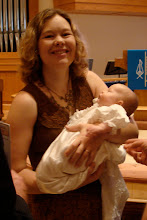
Here are some tidbits from his biography that I haven’t yet mentioned:
Francis de Sales (1567-1622) was the first of six children of an aristocratic family. His father had great ambitions for him – he literally had a Senate seat set aside for his son right out of school -- and was strongly opposed to his becoming a priest. His father grudgingly agreed to his son’s plans for the priesthood only after the provost of Geneva died (the #2 man after the bishop), and he was able to arrange for his son to take the position.
When Francis was studying in Paris, he spent six weeks of spiritual attack convinced that he was predestined to hell. (Recall that predestination was the hot topic of the day.) He was released from this fear after praying a prayer of surrender to God's will in front of a statue of Mary, and he consecrated himself to her protection.
When he became a priest, the first thing he did was go on mission, alone, to the Chablais region near Geneva, which was very Calvinist. He did not make a single convert for years. He could not preach in public, and people refused to talk to him, feed him or help him in any way. One winter night he secured himself high in a tree with his belt to escape from wolves, became frozen to the tree, and had to be rescued. Two things eventually changed the situation. First, Francis invented the religious tract (a dubious distinction if you ask me!). He wrote down the positions of the Catholic Church on disputed issues and stuck them under people’s doors at night. Second, the people of the Chablais came to admire and respect him for his kindness, affability, and continual ability to offer the other cheek when the first one was struck. It is said that when he arrived in the Chablais, there were not one hundred Catholics, and when he left the Chablais, there were not one hundred Calvinists. Over the course of his ministry, he is thought to have converted 72,000 people.
In retrospect, it’s easy to ask – why put all that effort into converting fellow Christians? Remember that this is the era when Catholic-Protestant relations were at their absolute lowest, when each thought the other was “unsaved”, and their leaders hurled wild invectives at each other when they weren’t actively persecuting each other. Given this situation, it was seen as incredible when Francis de Sales and Theodore de Beza, Calvin’s personal successor in Geneva, sat down with one another for amicable discussions. To this day, Francis de Sales is remembered as an example of how to love everyone, not just the people who agree with you.
When Francis became bishop of Geneva in 1602, he was a very busy man. He frequently traveled around his diocese and preached eloquently, and was on occasion seen with a halo of light around him as he preached. People flocked to hear his sermons. He made sure his people were well taught. He invented a sign language so he could personally prepare a deaf man for his First Communion, and found him a job as well. He also administered his diocese and co-founded an order of nuns that thrives to this day.
He thought that the main duty of bishop, however, was to provide personal spiritual direction to the people entrusted to his care. As such, he spent hours every day writing letters to people who asked him questions, giving them practical advice on how they could be freed from their sins and live more Christlike lives. From these letters came “Introduction to the Devout Life,” the manual of holiness for ordinary Christians.
Next time, I’ll write about what I learned from that book.


No comments:
Post a Comment